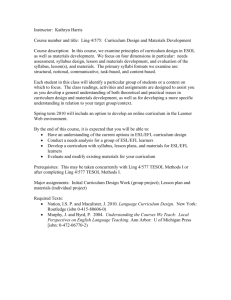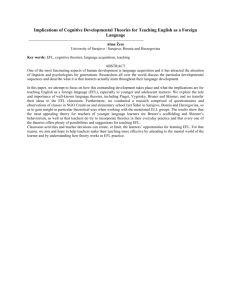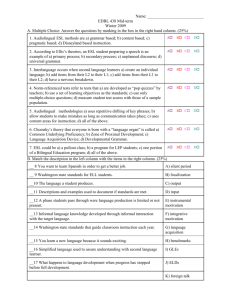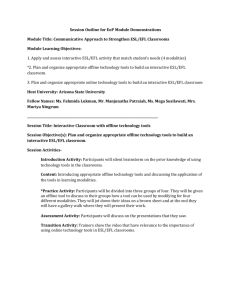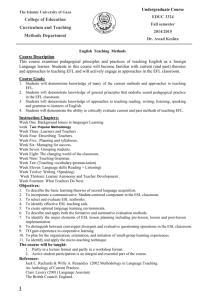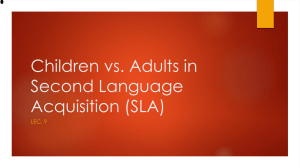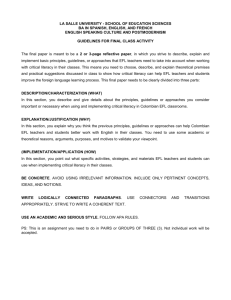English Education for Young Learners
advertisement
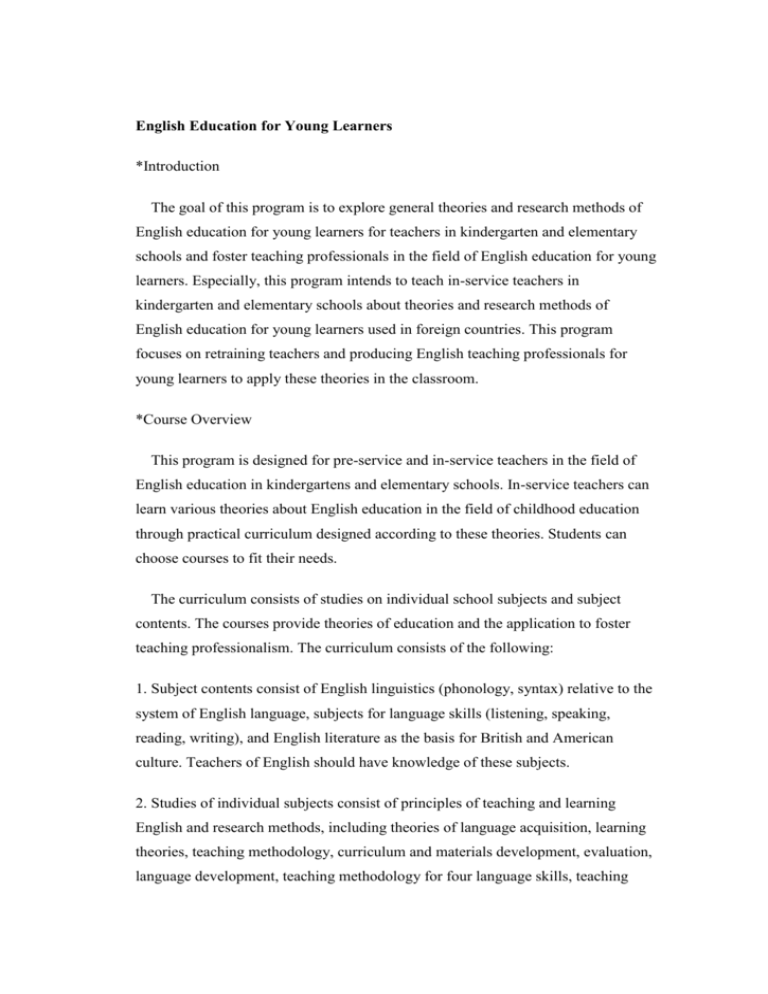
English Education for Young Learners *Introduction The goal of this program is to explore general theories and research methods of English education for young learners for teachers in kindergarten and elementary schools and foster teaching professionals in the field of English education for young learners. Especially, this program intends to teach in-service teachers in kindergarten and elementary schools about theories and research methods of English education for young learners used in foreign countries. This program focuses on retraining teachers and producing English teaching professionals for young learners to apply these theories in the classroom. *Course Overview This program is designed for pre-service and in-service teachers in the field of English education in kindergartens and elementary schools. In-service teachers can learn various theories about English education in the field of childhood education through practical curriculum designed according to these theories. Students can choose courses to fit their needs. The curriculum consists of studies on individual school subjects and subject contents. The courses provide theories of education and the application to foster teaching professionalism. The curriculum consists of the following: 1. Subject contents consist of English linguistics (phonology, syntax) relative to the system of English language, subjects for language skills (listening, speaking, reading, writing), and English literature as the basis for British and American culture. Teachers of English should have knowledge of these subjects. 2. Studies of individual subjects consist of principles of teaching and learning English and research methods, including theories of language acquisition, learning theories, teaching methodology, curriculum and materials development, evaluation, language development, teaching methodology for four language skills, teaching vocabulary, teaching grammar, and teaching pronunciation. Additionally, there are subjects such as field work and classroom supervision. *Course Content -Curriculum for In-service Teachers Classification No. Major Course Title Korean English HourCredit 1 어린이영어발음지도 Teaching pronunciation to children 2 2 2 어린이영어교육론 Theories of ESL/EFL education for children 2 2 3 영문학 개론 Introduction to British & American literature 2 2 4 영어학 개론 Introduction to English linguistics 2 2 5 어린이영어교수법 Theory and practice for teaching ESL/EFL to children 2 2 6 어린이영어교재연구 Materials development for teaching English to children 2 2 7 중급실용영어 Practical English (Intermediate level) 2 2 8 영어습득론 English language acquisition 2 2 2 2 2 2 2 2 9 고급실용영어 Practical English (Advanced level) Teaching ESL/EFL 10 어린이영어읽기, 쓰기지도법 reading & writing to children 11 어린이영어평가방법론 English language assessment for children 12 영어 회화 및 작문Ⅰ 13 어린이영어교육연구방법론Ⅰ 14 아동문학지도법 15 어린이영어교육세미나Ⅰ English conversation & composition Research methodologyⅠ Teaching ESL/EFL through children's literature Seminar on English education for 2 2 2 2 2 2 2 2 2 2 childrenⅠ 16 어린이영어교육세미나Ⅱ Seminar on English education for childrenⅡ 17 멀티미디어영어교육 Multimedia-assisted English education 2 2 18 어린이영어 어휘, 문법지도 Teaching ESL/EFL vocabularies & grammar to children 2 2 2 2 2 2 2 2 2 2 2 2 2 2 2 2 Early childhood 19 어린이영어습득론 20 English language acquisition 어린이영어교육 Research 연구방법론Ⅱ methodologyⅡ 21 어린이영어듣기, 말하기지도 22 영미문화이해 및 지도 Teaching speaking & listening to children Cross-cultural understanding and teaching of Englishspeaking cultures to children 23 영어회화 및 작문Ⅱ 24 수업장학 25 신화 및 우화지도 English conversation & composition Ⅱ ESL/EFL classroom supervision Teaching fables & fairy tales to children 26 어린이영어교육과정개발 ESL/EFL curriculum development for children 2 2 27 이중언어교육론 Bilingualism 2 2 28 어린이영어 문자언어발달 ESL/EFL literacy development in children 2 2 2 2 2 2 Multimedia-assisted 29 멀티미디어 어린이영어교육 English education for young learners 30 영어쓰기연습 English Writing Practice *Course Description Teaching pronunciation to children This course deals with principles of teaching pronunciation and appropriate methods for teaching pronunciation to children. Theories of ESL/EFL Education for Children Students study general learning theories and research methods relative to English education such as psychology, sociology, and theories of language acquisition. Introduction to British & American Literature In order to understand the literary backgrounds of English language, Students study literary works to gain knowledge of history, general characteristics, and literary customs of British and American literature. Introduction to English linguistics This course includes general linguistic theories of English linguistic systems such as phonetics, phonology, syntax and semantics. Theories and practice for teaching ESL/EFL to children This course helps students to apply various English teaching methods and skills in the classroom based on principles and learning theories of foreign language education. Materials development for teaching English to children Students compare domestic and foreign curriculum for teaching English to children and learn about development, analysis and use of teaching materials for teaching English to children. Practical English - Intermediate level Students practice listening, speaking, reading and writing skills for the topics and situations relative to daily life. English language acquisition Students study the differences between first language acquisition and foreign language acquisition as well as the differences between language acquisition and learning. They also explore the personal and social factors and their meanings in English education. Practical English - Advanced level Students practice an advanced level of English for enabling them to communicate in various situations on professional topics. Teaching ESL/EFL Reading & Writing to Children This course deals with theories of literacy development in children and appropriate teaching methods for teaching reading and writing to children. English Language Assessment for Children Students explore appropriate assessment methods for children and their applications based on various assessment theories and analyze their influences on the cognitive and affective developments of children. English Conversation & Composition Students practice English conversation and writing for daily life. Research MethodologyⅠ Students analyze the trends in English education for young learners and study quantitative approaches to research design and treatment analysis. Teaching ESL/EFL through children's literature Students study the influence of literature on English education for young learners and its application in the EFL environment. Seminar on English Education for ChildrenⅠ Students analyze the international trends in English education for young learners and find out their implications for EFL classrooms. Seminar on English Education for childrenⅡ Students analyze research trends and their application to various topics in English education for children. Multimedia-Assisted English Education Students study the learning theories regarding the use of various types of multimedia such as computers, videos, and e-learning. They also study the influences of those media and how to apply these theories in practice. Teaching ESL/EFL Vocabulary & Grammar to Children This course deals with principles and teaching methodology of vocabulary acquisition. Students understand the meaning of teaching grammar and its application in English education for young learners. Early Childhood English Language Acquisition This course deals with the differences between first language acquisition and second language acquisition. It also includes general theories and issues of language acquisition for successful foreign language acquisition such as social, cultural, and personal factors and the characteristics in the language development procedure. Research MethodologyⅡ Students practice various research methods based on the knowledge of the principles and values of qualitative research and apply them in field research. Teaching Speaking & Listening to Children Students study the characteristics and development of oral language and learn teaching and learning methods for listening and speaking. Cross-Cultural Understanding and Teaching of English-Speaking Cultures to children Students learn the differences between the cultures of English speaking countries and other countries. This course also includes verbal and nonverbal characteristics of English language reflecting cultural elements and teaching methods for cultural elements. English Conversation & Composition Ⅱ Students practice English conversation and composition on specific topics. ESL/EFL Classroom Supervision Students learn theories of classroom supervision and various skills needed for classroom supervision (observation, interview, anecdotal report, and analysis of teacher’s language). Based on this knowledge, they practice classroom supervision. Teaching Fables & Fairytales to Children Students analyze the characteristics of fables and fairytales and carry out analysis of teaching materials and teaching methodology. ESL/EFL Curriculum Development for Children This course deals with comparison of English curriculum in different countries, curriculum developments and application in classroom based on the characteristics and principles of English curriculum. Bilingualism Based on the concepts of bilingualism, students compare bilingual education programs in different countries and analyze the influence of bilingual education on foreign language acquisition and development of children. ESL/EFL Literacy Development in Children Students learn theories of English literacy development, characteristics and developmental phases of English literacy and seek appropriate teaching methods for literacy in children. Multimedia-Assisted English Education for Young Learners Students learn how to use various types of multimedia in English education for young learners. This course includes textbook development, program and evaluation tools using multimedia and their applications in classroom. English Writing Practice Students learn basic principles and various writing skills based on the knowledge of vocabulary, morphemes, syntax and stylistics. They improve writing skills through practicing composition.

